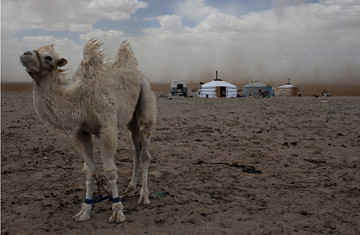
Nomads still live in traditional gers around Mongolia's biggest economic undertaking: the Oyu Tolgoi mine.
(5 of 6)
Cue the new American gold rush. In recent months, a slew of high-profile U.S. lobbyists have made pilgrimages to Ulan Bator, from former Secretary of Defense Donald Rumsfeld to ex--House majority leader Richard Gephardt. The Missouri Democrat was in town in July to push the interests of St. Louis--based Peabody Energy, which wants a share of Tavan Tolgoi, whose fate has yet to be decided. One of Peabody's biggest rivals for the bid? China's state-owned Shenhua Energy, the People's Republic's biggest coal miner. That is, if the project doesn't get bogged down for years in populist politics.
Many are betting it won't. At one of the hottest nightclubs in Ulan Bator, as a strobe illuminates his reddened face, an inebriated Western banker leans over to me and describes Mongolia as the next Gulf state--except with more accessible ladies of the night. Over the past five years, the Mongolian capital has transformed into an uneasy mashup of Soviet concrete blocks and half-finished glass towers. Shiny Land Cruisers do battle on the potholed roads with Soviet-era Ladas. A Louis Vuitton store shares a square with a statue of Genghis Khan.
Yet one-third of Mongolians still live in poverty. The country's growing wealth gap stretches from mining executives chauffeured in Hummers to destitute herdsmen who have lost their animals. Alcoholism is rife, fueled by consumption of cheap vodka and distilled fermented mare's milk. Earlier this year, the World Bank warned that the Mongolian economy could overheat as a burst of government spending triggers inflation. Add, too, the specter of corruption, as some of the foreign investment rushing into Mongolia inevitably ends up lining private pockets. The watchdog group Transparency International ranks Mongolia 120th out of 183 countries in terms of perceptions of clean governance. "Have ordinary people benefited from our rapid economic growth?" asks Lundeg Purevsuren, a top foreign policy adviser. "Many would say they have not." Indeed, Ulan Bator's suburbs are ringed with tenements of gers, some pitched in abandoned graveyards or derelict factory grounds.
Nature vs. Nurture
The tent slums quickly give way to Mongolia's great grasslands. On average, the nation is populated by just two people per sq km. The country feels empty, but Mongolians say they like it that way. "There's an old Mongolian joke," says Elbegdorj. "If you see smoke from another person's fire, you don't go near it. You travel far enough that you don't see it anymore. Then you feel like you can pitch your tent."
